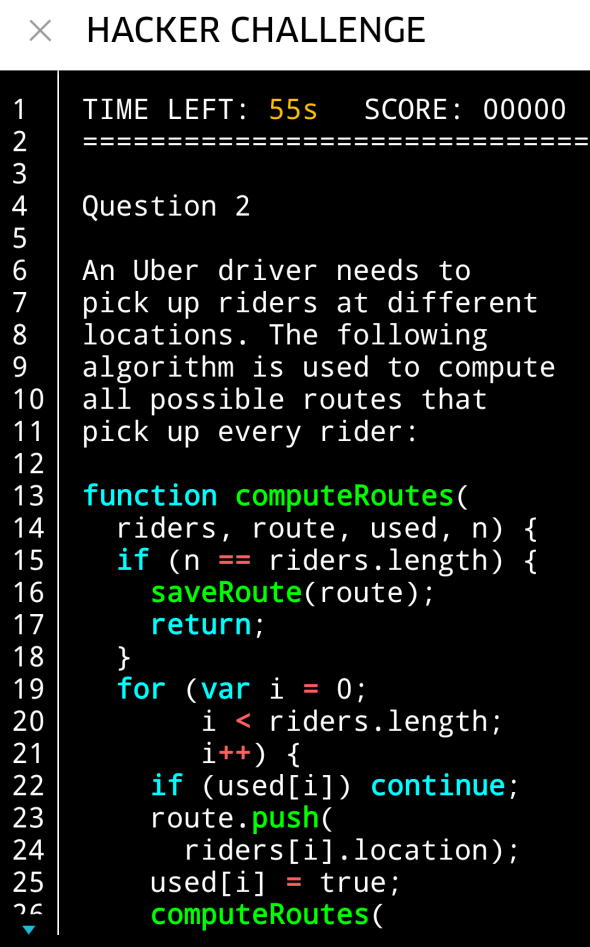During a recent Uber trip that took him close to MIT, a Slate employee received an unusual notification from the app. Under the heading Code on the Road, Uber offered him the opportunity to “Flex [his] hacker skills for a chance to chat with the Uber team.”
In what followed, he was confronted with a series of timed puzzles, all of which were part of a “Hacker Challenge” designed to test basic coding skills over the course of a ride. The first question asked him to decide “Which data structure” he would use to “dispatch the driver with the shortest ETA.” A second had him evaluating an algorithm meant “to compute all the possible routes” a driver might use to “pick up every rider.” As users have shown on Twitter, if you succeed at answering these questions, the challenge concludes with an opportunity to receive “more information on what it’s like working for Uber.”
In an email sent Friday afternoon, an Uber representative confirmed the existence of the Code on the Road initiative and suggested that it was a way of reaching out to talented coders from nontraditional backgrounds. “The option to play gives interested riders the opportunity to show us their skills in a fun and different way—whether they code on the side or are pursuing a career as a developer,” the representative wrote.
This statement, which was also sent to Business Insider, further explains that Uber deploys the option to play primarily in places “where a lot of people work in tech,” like the Boston area. Some on Twitter have suggested that it shows up during events linked to the tech world, such as SXSW, too. (The game also appears to have been deployed in Denver and Portland, Oregon, among other cities.)
Uber isn’t the first company to slyly gameify the hiring process. Google, for example, famously seeks out candidates through a semisecret coding game known as foo.bar. It shows up to those who search for certain coding-specific terms, such that—like Code on the Road—it’s embedded within the company’s services. Uber also uses the site CodeFights, which lets visitors compete to solve programming challenges, as a recruitment tool, inviting players to grapple with the sort of problems they might encounter while working for the company.
Even in this larger context, however, Code on the Road stands out for its geolocational qualities. Beyond reaching out to users in certain locations, the company doesn’t appear to have done any additional targeting. You don’t have to have expressed any interest in coding to come across it; you just have to be in the right place at the right time. That means it’s potentially making contact with those who might not consider themselves qualified to apply for a job with the company otherwise or even know that it’s hiring.
This approach squares with the hiring model that Uber has publicly embraced in the past. Discussing his company’s collaboration with CodeFights, Uber’s head of growth recruiting, Bob Cowherd, claimed that it “moves the raw-talent test piece up to the very first step in the process,” allowing the company to connect with “candidates we probably wouldn’t have found through traditional recruiting.” As the tech world continues to expand its approach to diversity hiring and its understanding of what diversity entails, efforts like this one may well become increasingly normative.
Nevertheless, charming as Code on the Road is, there may still be reason to be skeptical of it. Some advocates for diversity in tech have worried that the very word hacker may dissuade minority candidates from applying to positions in the first place, thanks to its connotations of bro-y masculinity. If that’s true, then the name “Hacker Challenge” may still be predisposing Uber to the standard pool of potential employees.
More troubling in this respect is the company’s selective deployment of the game. Since it’s only appeared thus far in locations and contexts with established tech cultures (at least, as far as I can tell), it’s more likely to help reaffirm existing hiring norms than to challenge them. While CodeFight has a broader potential reach, Code on the Road seems more likely to put Uber in touch with its competitors’ employees than it does to net them truly nontraditional candidates.
In the end, it’s possible that none of this will matter: There’s no evidence yet that Uber has actually hired anyone through its in-app initiative.
